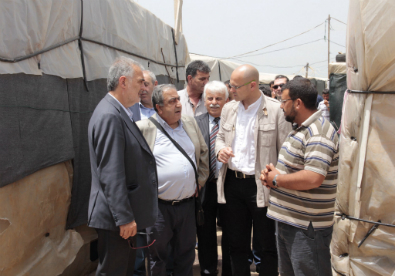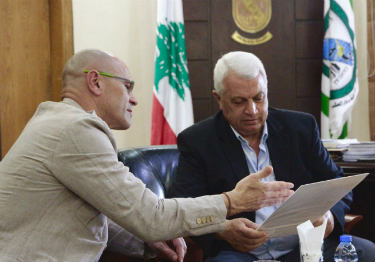- The Minister of Foreign Affairs travels to Lebanon to oversee Catalan development projects and establish new alliances in the region
- The Catalan Government broadens its cooperation and implements 17 projects through NGOs, the United Nations and the Lebanese government

On Saturday, the Minister of Foreign Affairs, Institutional Relations and Transparency, Raül Romeva, travelled to Lebanon, where he visited two projects implemented by the Catalan Government through NGOs, the United Nations and the Lebanese government. This is the second official visit the Minister has undertaken to Lebanon, after leading a Catalan delegation to the country in 2016 with the objective of broadening Catalan cooperation and tackling the crisis in the Mediterranean, increasing the number of projects in Lebanon and the surrounding countries from 6 to 17.
On Sunday Romeva visited the refugee camp and medical centre in the town of Halba, the capital of the Akkar region that shares a border with Syria, where 35% of the population are refugees. The Catalan Government runs a project in the region that provides healthcare materials and access to specialist medical services for refugees. This is one of 17 projects the Government is implementing through NGOs on the ground, including Associació Catalunya-Líban, Fundació Pau i Solidaritat and Socors Popular Libanès. The Minister also visited the refugee camp in the area and met with the region’s governor and elected representatives, the Mayor of Halba and the president of the region’s union of municipalities.
The Minister assured that through the country’s cooperation projects in Lebanon, “Catalonia reaffirms its commitment to refugees”. “We want to cooperate in building the necessary response to the crisis in the Mediterranean”, he explained. “This is what Catalan society has demanded”, the Minister continued, “and through these actions we want to improve the situation of refugees fleeing from conflicts in the region, especially in Syria”. “The arrival of refugees has had a particularly heavy impact at a local level, especially regarding the management of basic services; we want to strengthen these services for the whole population”, Romeva affirmed.
In the evening the Minister met with the mayor of Tripoli and president of the Union of Municipalities, Ahmad Kamareddine, and visited the waste processing plant in the Al-Fayhaa region, which was built thanks to a Catalan cooperation project implemented through the United Nations Development Programme (UNDP) and the Lebanese Ministry of Social Affairs, in the framework of the Lebanon Host Communities Support Project (LHSP). The aim of the project is to help run municipal services that are currently overwhelmed by the increase in population, such as waste management, disposal and recycling, managing and supplying water, primary health care and health services for the population. Al Fayhaa, the region where these municipalities are located, is the Lebanese region that receives the most refugees from Syria through the Homs and Aleppo corridors.

The Government of Catalonia, the Barcelona City Council, the Barcelona Provincial Council, the Barcelona Metropolitan Area (AMB) and the Catalan Fund for Development Cooperation are working together in Lebanon through an agreement with the UNDP. In this regard, Catalonia’s monetary contribution amounts to 800,000 euros for the 2016-2017 period, in which it will also be providing technical knowledge, expertise and exchange of experience in the field.
On Monday, the Foreign Affairs minister met with representatives of various UN agencies, EU representative in Lebanon and the Lebanese Minister for Social Affairs to analyse new areas for joint action with the Catalan Government. The week’s visit marks the continuity and strengthening of cooperation actions to tackle the crisis in the Mediterranean, with projects in Lebanon, Jordan, Syria, Iraq and Greece and to ensure safe refugee sea routes to Italy and Greece.
The Mediterranean crisis: a priority in the 2017 Cooperation Plan
Earlier in May, Minister Romeva presented this year’s Annual Development Cooperation Plan drawn out by the Ministry of Foreign Affairs with a budgetary increase of 65.5%, thereby focussing cooperation efforts in foreign policy. The plan, which reverses recent cuts with an increase of 65.5%, reinforces Catalonia’s commitment to cooperation by responding to the situation in the eastern Mediterranean.
Earlier in May, Minister Romeva presented this year’s Annual Development Cooperation Plan drawn out by the Ministry of Foreign Affairs with a budgetary increase of 65.5%, thereby focussing cooperation efforts in foreign policy. The plan, which reverses recent cuts with an increase of 65.5%, reinforces Catalonia’s commitment to cooperation by responding to the situation in the eastern Mediterranean.
The new plan includes a call for multi-year projects, spanning a maximum of 30 months, to offer more stable, sustained and efficient cooperation in areas affected by conflict and humanitarian crises. This specific call for projects prioritises those in the Mediterranean and aims to change the reality faced by many refugees in Lebanon.
Lebanon’s geographical position, neighbouring Syria and a bridge to the Mediterranean means that up to 1.1 million Syrians have fled there since the start of the conflict. With the addition of a further 450,000 Palestinian and 10,000 Iraqi refugees to the country’s existing population of 4.4 million, Lebanon has the highest concentration per capita of refugees in the world; one in four inhabitants is a refugee.
